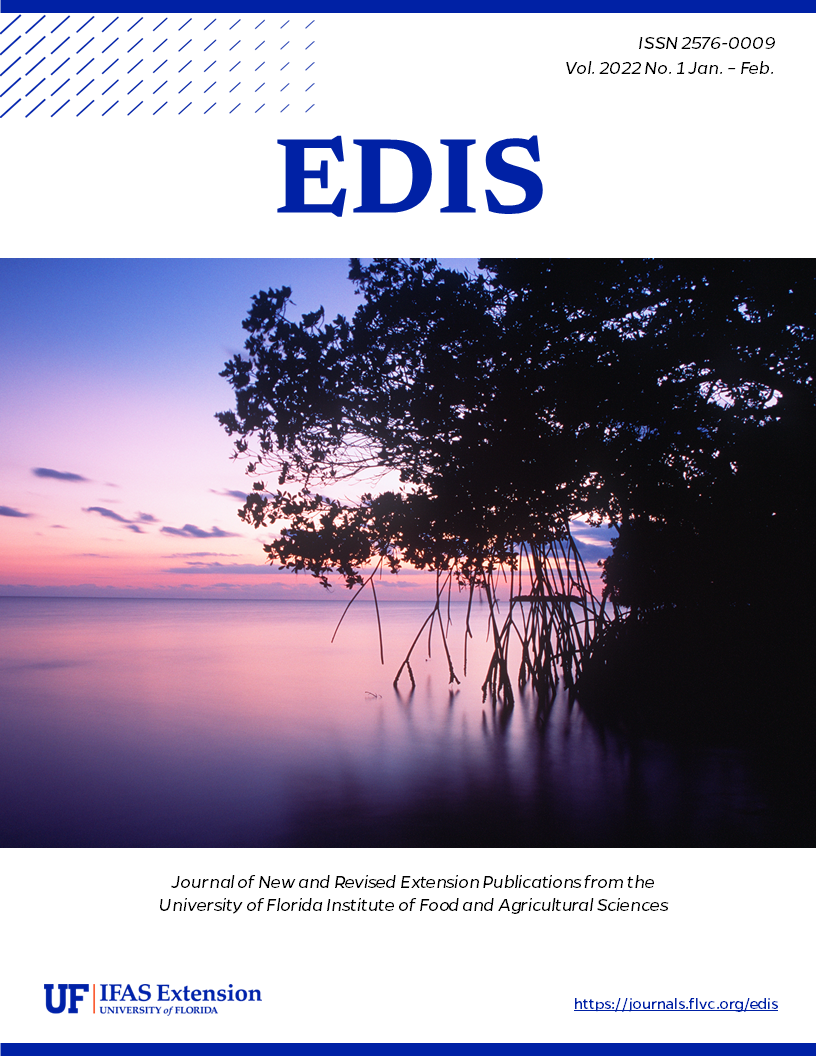Abstract
Protection of the quality of Florida water resources is an important priority for the public and the government agencies (Figure 1). Pollution of surface water (e.g., lakes, rivers, and streams) can be linked to fish kills, changes in the color and aesthetic appeal of the resource, changes in the quality of habitat for aquatic plant and animal life (leading to changes in the plant and animal communities), and to human health issues. To address the pollution problems, a variety of programs is implemented at the federal, state, and local levels. Despite these programs, water quality problems persist. A recent FDEP water quality assessment report shows that the concentration of nitrogen in surface water is increasing in some Florida regions, and most assessed rivers, streams, canals, lakes, and estuaries were not meeting surface water quality standards (FDEP 2016). Although there have been gains in pollution reduction, reducing pollution and improving water quality is still a public policy objective in Florida. Costs to implement Florida's water policy objective will be borne by Florida citizens and businesses. Market-based programs, such as water quality credit trading, can provide environmental benefits at lower costs and more quickly than other policy instruments (Shortle 2013). In this document, we review the basic components of a water quality credit trading program and discuss opportunities and challenges associated with a water quality credit trading program design. Technical terms used in this publication are bolded, and a glossary is available at the end of the document.
References
Abdalla, C., T. Borisova, D. Parker, and K. Saacke Blunk. 2007. Water quality credit trading and agriculture: Recognizing the challenges and policy issues ahead. Choices 22(2). http://www.choicesmagazine.org/2007-2/index.htm
Avila, J., K. Grogan, and S. Larkin. 2015. Estimating the Value of Ecosystem Services Generated by the Hard Clam Industry in Florida. Project Report, Food and Resource Economics Department, University of Florida. http://shellfish.ifas.ufl.edu/wp-content/uploads/valuation-summary-083115.pdf
Baker, S., K. Grogan, S. Larkin, and L. Sturmer. 2016. Environmental Benefits: "Green" Clams: Estimating the Value of Environmental Benefits (Ecosystem Services) Generated by the Hard Clam Aquaculture Industry in Florida. Gainesville, FL: University of Florida, IFAS. http://shellfish.ifas.ufl.edu/environmental-benefits/
Bennett, G., N. Carroll, and K. Hamilton. 2013. Charting new waters: State of watershed payments 2012. Ecosystem Marketplace, January 17. http://www.ecosystemmarketplace.com/pages/dynamic/article.page.php?page_id=9542§ion=news_articles&eod=1
FDACS. 2021. Agricultural Best Management Practices. Tallahassee, FL: Florida Department of Agriculture and Consumer Services (FDACS). https://www.fdacs.gov/Agriculture-Industry/Water/Agricultural-Best-Management-Practices
FDEP. 2016. Integrated Water Quality Assessment for Florida: 2016 Sections 303(d), 305(b), and 314 Report and Listing Update. Tallahassee, FL: Florida Department of Environmental Protection (FDEP). http://www.dep.state.fl.us/water/docs/2016-Integrated-Report.pdf
FDEP. 2021. Watershed Management: Basin Management Action Plans. Tallahassee, FL: Florida Department of Environmental Protection (FDEP). https://floridadep.gov/dear/water-quality-restoration/content/basin-management-action-plans-bmaps
Greenhalgh, S., and M. Selman. Comparing water quality trading programs: What lessons are there to learn? The Journal of Regional Analysis and Policy 42(2):104-125
McCann, L., B. Colby, K.W. Easter, A. Kasterine, and K.V. Kuperan. 2005. Transaction cost measurement for evaluating environmental policies. Ecological Economics 52:527-542. https://doi.org/10.1016/j.ecolecon.2004.08.002
Migliaccio, K.W., K.T. Morgan, B.J. Boman, S. Guzman, and H. Bayabil. 2019. Total Maximum Daily Loads and Agricultural BMPs in Florida. AE388. Gainesville, FL: University of Florida, Institute of Food and Agricultural Sciences. https://edis.ifas.ufl.edu/AE388
NCCOS. 2017. Nutrient Crediting of Oyster Aquaculture in Chesapeake Bay. Silver Spring, MD: National Centers for Coastal Ocean Science (NCCOS). https://coastalscience.noaa.gov/news/coastal-pollution/nutrient-crediting-oyster-aquaculture-chesapeake-bay/
Selman M., E. Branosky, and C. Jones. 2009. Water Quality Trading Programs: An International Overview. Washington, DC: Water Resource Institute. http://www.wri.org/publication/water-quality-trading-programs-international-overview
Shortle, J. 2013. Economics and environmental markets: Lessons from water-quality trading. Agricultural and Resource Economics Review 42(1):57-74. https://doi.org/10.1017/S1068280500007619
UF/IFAS. 2017. Best Management Practices. Gainesville, FL: University of Florida, Institute of Food and Agricultural Sciences. http://bmp.ifas.ufl.edu/index.php
US EPA. 2017a. Clean Water Act Section 303(d): Impaired Waters and Total Maximum Daily Loads. Washington, DC: United States Environmental Protection Agency (US EPA). https://www.epa.gov/tmdl (accessed on June 14, 2017)
US EPA. 2017b. NPDES Wastewater and Stormwater Permits. Washington, DC: United States Environmental Protection Agency (US EPA). https://www.epa.gov/npdes-permits/npdes-permits-epas-pacific-southwest-region-9
US EPA. 2017c. Polluted Runoff: Nonpoint Source Pollution. United States Environmental Protection Agency (US EPA), Washington, D.C. https://www.epa.gov/nps
US EPA. 2016a. Learn About Effluent Guidelines. Washington, DC: United States Environmental Protection Agency (US EPA). https://www.epa.gov/eg/learn-about-effluent-guidelines
US EPA. 2016b. Water Quality Trading. Washington, DC: United States Environmental Protection Agency (US EPA). https://www.epa.gov/npdes/water-quality-trading

